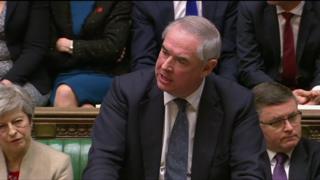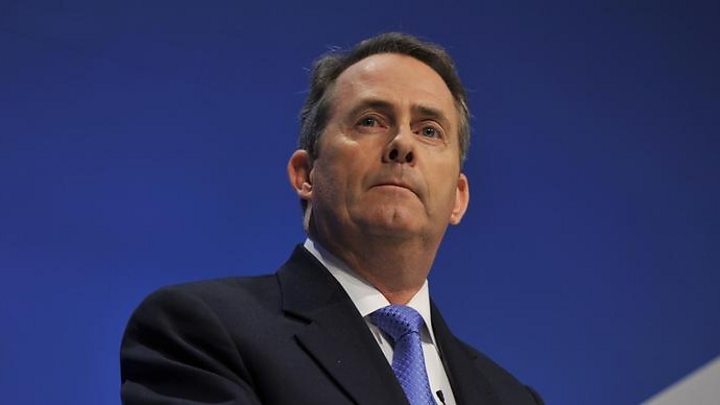Brexit: MPs face new vote on withdrawal deal

Theresa May will attempt to get MPs to back part of her Brexit deal later, on the day the UK was due to leave the EU.
MPs will vote on the withdrawal agreement, covering the terms of the UK’s exit from the EU, at 14.30 GMT.
Attorney General Geoffrey Cox told MPs the deal must be approved by 2300 GMT if the UK wants to “secure our legal right” to an extension to Brexit.
If it does not, any further delay past 12 April would be “subject to the veto of 27 [EU] leaders”, he said.
But Labour will vote against it, saying without the political declaration part of the deal outlining future UK-EU relations, it is a “blindfold Brexit”.
Shadow Brexit Secretary Sir Keir Starmer said it was a “desperate act” by the prime minister.
“Take the political declaration off and it is completely blind – you have no idea what you are really voting for,” he told BBC Radio 4’s Today.
The withdrawal agreement to be voted on by MPs is a legally-binding document setting out the terms of the UK’s departure from the EU. It includes:
- Details of the UK’s £39bn financial settlement with the EU
- Guarantees about the rights of EU and UK citizens
- Details of “transition period” until the end of 2020
- Controversial arrangements for the backstop, which seeks to prevent the return of customs infrastructure at the Irish border in the event no UK-EU trade deal is enforced.
Opening Friday’s debate, Mr Cox said that the European Council last week had agreed that Brexit could be delayed until 22 May – if the withdrawal agreement was approved by the end of this week.
If they do not, it offered a shorter delay until 12 April – the date by which the UK would have to indicate whether it would stand candidates in the 2019 European Parliament elections – allowing the UK time to get the deal through or to “indicate a way forward”.
“This is therefore the last opportunity to take advantage of our legal right and the government has taken the view that it would be wrong to allow that time and date to expire, without giving this House the opportunity to consider whether it should avail itself of the legal right,” Mr Cox told MPs.
He said it did not amount to a “meaningful vote” on the overall deal – as it did not include the political declaration but he said the EU had accepted that that part of the deal was still open to negotiation, while the withdrawal agreement was not.
He said approving the deal on Friday would “bring certainty to thousands of businesses and millions of individuals throughout this country and one million citizens of our country residing in the EU”.
But Labour’s Chris Bryant said it would bring “no certainty” as it would not mean the overall deal was ratified: “If anything, today throws more uncertainty into the process.”

Media playback is unsupported on your device
And Labour MP Hilary Benn questioned whether if Brexit was delayed until 22 May, but no agreement was reached by then on the political declaration, whether the UK would be able to seek a further extension.
He suggested it would then be too late to take part in the European Parliamentary elections, which the EU has indicated the UK would need to do if it was to get a longer delay to Brexit.
What happens if MPs back or reject it?
With the DUP also planning to vote against it, the BBC’s political editor Laura Kuenssberg said it looked like the PM was heading for another defeat although the result was likely to be far closer this time around.
The prime minister has already lost two such votes on the full deal by large margins, and Commons Speaker John Bercow had ruled out bringing the same motion back a third time without “substantial” changes.
However, the government says a vote on the withdrawal deal alone – the “divorce deal” – will be enough to meet the criteria laid down by EU leaders for the postponement of Brexit from 29 March to 22 May.
If it passes, Friday’s vote will not allow Parliament to ratify the entire withdrawal package, because the law allows this only after the passage of a “meaningful vote” on both parts of the deal.
If it does not pass, the EU’s chief Brexit negotiator, Michel Barnier, has warned the UK will face leaving the EU without a deal or a longer extension – involving taking part in European Parliament elections.
In this scenario, ministers will have until 12 April – the date by which the UK would have to indicate whether it would stand candidates in the elections – to “indicate a way forward”, with the EU expected to hold an emergency summit to decide if the conditions for a longer delay are met.
BBC Brussels reporter Adam Fleming said an extension of about a year was being touted at an EU meeting on Thursday, but only if the UK had a “clear plan” and if it took part in the European elections.
If the government wins the vote, it will either have to pass the political declaration on the future relationship at a later date, or change the law so that it is not needed to ratify the treaty.
The BBC’s Laura Kuenssberg said she expected ministers to bring forward the Withdrawal and Implementation Bill as early as next week to begin this process.
There are signs now that many Eurosceptic MPs are ready to say “yes” – not because they suddenly have realised Theresa May’s deal is perfect, but because more of them officially realise that it is the clearest break from the EU they can realistically hope for.
Yet her Northern Irish allies are not persuaded. Labour, even though they have sometimes accepted that what’s on the table – the divorce deal – will never be unpicked by the EU, will still, in the main, resist.
As things stand, even though some influential Brexiteers believe there is a chance it will get through, it looks like the prime minister is heading for another loss.
But for Number 10, it is another way of extending the road before it finally runs out.





